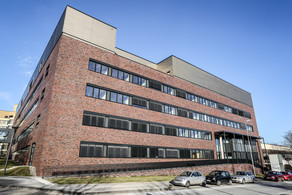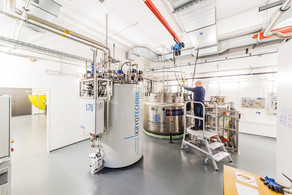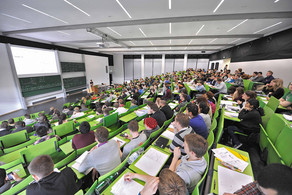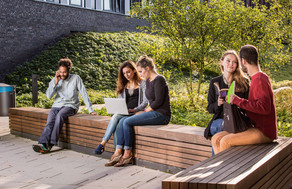Partner universities
Here you will find a current overview of the universities with which we currently have Erasmus cooperation agreements. The International Office also maintains a list of our partner universities.
Please note that when choosing a partner university, courses of departments other than the physics department (exceptions are always language courses) can only be selected in rare cases. Therefore you need to make sure to select a university where you are interested in the courses offered by the physics department.
France
Number of spots: 2 x 10 months
Language requirements: English B2 and French B2 (if attending courses in French)
More information can be found on the page of the university.
Research areas
The research areas (as well as the focus for the Master degree courses) at the Université Clermont Auvergne are:
- Nanophysics at the Institut Pascal
- Universe & Particles (ATLAS, LHCb) at the LPC
IMAPP
The Université Clermont Auvergne is a partner university of the International Master on Advanced Methods in Particle Physics (IMAPP). The cohort is in Clermont Ferrand during the winter term and the following courses are offered:
- Introduction to quantum field theory and gauge theories
- Introduction to particle physics and the experimental foundations of the Standard Model
- Programming and data analysis
- Statistics and artificial intelligence
More information can be found on the IMAPP webpage (see first semester). Detailed descriptions of the courses can be found in the IMAPP handbook.
It is strongly recommended to only visit Clermont for an exchange during the first semester (fall) as the number of courses in the second semester (spring) are significantly limited.
Number of spots: 2 x 10 months
Language requirements: English B2 and French B2 (if attending courses in French)
More information can be found on the page of the university.
Research areas
The research areas at the department of physics (PhiTEM) at the Université Grenoble Alpes are:
- Astrophysics
- Energy materials
- Medical physics and radiation protection
- Nuclear energy
- Particle physics (ATLAS), astroparticle physics and cosmology
- Photonics and semiconductors
- Quantum materials
- Turbulences, methods and applications
Greece
Number of spots: 2 x 6 months
Language requirements: exchange students can attend courses in English or work e.g. on supervised projects . To be able to attend english courses, a level of B2 is required.
More information can be found on the page of the university as well as the webpage for Erasmus students.
Research areas
The research areas at the Aristotle University of Thessaloniki are:
- Astrophysics, astronomy and mechanics
- Nuclear and elementary particle physics
- Electronics and computers
- Applied and environmental physics
Italy
Number of spots: 4 x 10 months
Language requirements: The courses of the Master's degree are only taught in English (at least B2). Courses in Italian can be also attended if the students demonstrate the necessary language requirements (at least level B1)
More information can be found on the page of the university.
Research areas:
The research areas at the Università degli Studi di Bologna are:
- Applied Physics and Complex Systems
- Atmospheric physics
- Astrophysics
- Nuclear and subnuclear physics (e.g. ATLAS, LHCb)
- Physics education and history of physics
- Physics of consensed matter, atoms and molecules
- Physics of the Earth
- Theoretical physics
IMAPP
The Università degli Studi di Bologna is one of the partner universities of the International Master on Advanced Methods in Particle Physics (IMAPP). The cohort is in Bologna during the winter term and the following courses are offered:
- Advanced Standard Model
- Phenomenology and experimental flavour physics
- Computer science for High energy physics
More information can be found on the IMAPP webpage (see third semester). Detailled descriptions of the courses can be found in the IMAPP handbook.
Number of spots: 2 x 6 months
Language requirements: a large number of courses is offered in Italian, at least level B2 is required to be able to attend the courses. Some of the courses are regularly offered in English. The ECTS catalogue lists the course language.
More information can be found on the webpage of the university.
Research areas
The research at the Università di Pisa focusses on the following areas:
- Astrophysics
- Fundamental interactions (ATLAS, LHCb)
- Applied physics
- Physics of Matter
- Theoretical physics
Sweden
Number of spots: 2 x 10 months
Language requirements:
- Bachelor: large number of courses in English (at least B2)
- Master: large number of courses in English (at least B2)For
- For Swedish courses at least B1 is required
More information can be found on the website of the university.
Research areas
The research areas at the Stockholms universitet are:
- Astroparticle (e.g. IceCube) and particle physics (e.g. ATLAS)
- Atomic physics
- Chemical physics
- Condensed Matter and quantum optics
- Cosmology, particle astrophysics and strings
- Instrumentation and nuclear physics
- Medical radiation physics
Number of spots: 3 x 10 months
Language requirements:
- Bachelor: large number of courses in English (at least level B2)
- Master: large number of courses in English (at least level B2)
More information can be found on the website of the university. Exchange students can only courses listed on the course webpage for exchange students.
Research areas
The research areas at the Umeå universitet are:
- Plasma and Space Physics
- Condensed matter physics
- Atomic, Molecular, and Optical Physics (AMO)
- Network and statistical physics
- Biological Physics
Spain
Number of spots: 2 x 10 months
Language requirements: B1 for courses in Spanish
More information can be found on the website of the university.
Research areas
The research areas at the Universidad Autónoma de Madrid are distributed among different departments:
Number of spots: 2 x 10 months or 4 x 5 months
Language requirement: B1 for courses in Spanish
More information can be found on the website of the university.
The University of Valencia follows a 4+1 system instead of the 3+2 system in German for the Bachelor and Master degree. Students can only attend courses of the undergraduate programme (first four years).
Research areas:
The research areas at the Universitat de València are:
- Astronomy and astrophysics
- Applied physics and electromagnetism
- Atomic molecular and nuclear physics
- Theoretical physics
- Earth physics and thermodynamics
- Optics
Czech Republic
Number of spots: 2 x 5 months
Language requirements: English B2 or Czech B2
More information can be found on the webpage of the university.
We have an Erasmus+ agreement with the Faculty of Electrical Engineering. When selecting courses, please take note of the following information from CTU:
You should normally take most of your courses at your host CTU faculty (minimum 50%). BUT you can also apply for courses at other CTU faculties. Note that the Architectural Design Course at the Faculty of Architecture is available only for students registered at the Faculty of Architecture.
Research areas
The research areas at CVUT are:
- Nuclear and particle physics (e.g. ATLAS)
- Mathematical physics
- Physics of plasma and nuclear fusion
- Quantum technologies
Turkey
Number of spots: 1 x 10 months
Language requirements: English B1
More information can be found on the webpage of the university.








